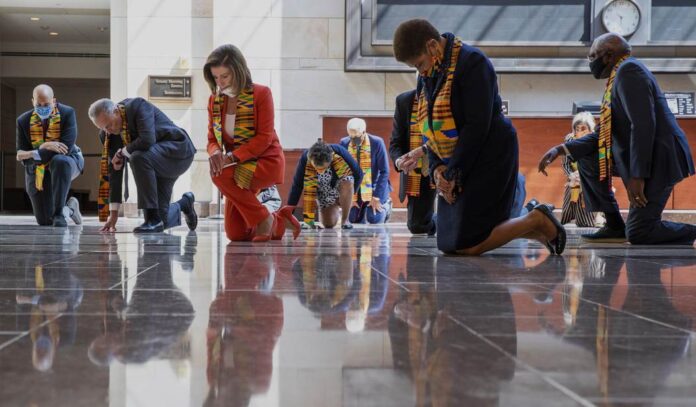A Connecticut school choir is singing a political song about weather, and it doesn’t concern climate change. Rather, the subject is social justice’s most iconic figure.
According to Campus Reform, New Fairfield High has been rehearsing for an important New York performance. To be belted: “Weather: Stand the Storm.” The tempestuous title regards the torrential downpour of chaos that occurred in 2020, ignited by the late George Floyd’s pivotal plight on May 25th in Minneapolis.
The song — which is part of a larger work — began as a poem penned by Claudia Rankine, co-founder of the Racial Imaginary Institute. The group’s homepage nods to ubiquity:
We are committed to the activation of interdisciplinary work and a democratized exploration of race in our lives. … [N]o sphere of life is untouched by race…
Race may be everywhere, but that doesn’t mean analysis isn’t due. In a 2016 discussion with The Guardian — titled “Claudia Rankine: Why I’m Spending $625,000 to Study Whiteness” — she dropped science:
“[I]t’s important that people begin to understand that whiteness is not inevitable… … Conceptions and constructions of whiteness (have been) made and then propped up with eugenics and propped up with false science and false rhetoric and maintained through the justice system in every way. … There’s a lot of other ways to start thinking about whiteness, and it involves the kind of underbelly that has been kept from the American public.”
What isn’t being kept from the public: Claudine’s poem, now set to music by Temple University Professor Rollo Dilworth. Thanks to New Fairfield choir director Andrew Gadwah, the syllables sail on the winds of teen voices. Among other things, they reference the amount of time George Floyd spent beneath Officer Derek Chauvin’s knee. A sampling, as printed by The New York Times:
Black.
Just us and the blues kneeling on a neck
with the full weight of a man in blue.
Eight minutes and forty-six seconds.
In extremis, I can’t breathe gives way
to asphyxiation, to giving up this world,
and then mama, called to, a call
to protest, fire, glass, say their names, say
their names…
And:
[W]hite silence equals violence,
the violence of again, a militarized police
force teargassing, bullets ricochet, and civil
unrest taking it, burning it down. Whatever
contracts keep us social compel us now
to disorder the disorder. Peace. We’re out
to repair the future.
Campus Reform reports the song’s tempo as 46 — George’s age when he passed away.
Culturally, Mr. Floyd appears to occupy a phenomenally unique space — he’s a martyr who died without having lived in a way that remotely prompted his martyrdom. By the sheer nature of his passing, the man has reached legendary — if not sacred — status:
The George Floyd Neighborhood is Now a No-Cop Memorial
American Psychiatry Association Condemns the ‘Structural Racism’ Murder of George Floyd
George Floyd Gets His Own Hologram, and It’s Set for a Confederate Tour
George Floyd Gets His Own Exhibit — at a Holocaust Museum
Not everyone at New Fairfield is happy with choir teacher Andrew’s musical selection; some students have complained to him. Nonetheless, it appears the ensemble is still set for its big show — at Carnegie Hall. School calendar entries designate the trip for April 25th and 26th — the latter being the date for the Harmonic Convergence Concert. Per CarnegieHall.org, the night “represents the culminating performance of the 2024 Nationals for Top Choirs festival.”
As for Claudine, whether or not the song makes it to New York won’t likely affect her esteem. She’s a lauded writer, having won a 2014 National Book Award, National Book Critics’ Circle poetry award, and PEN Center USA Poetry Award. Those accolades were in response to her book, “Citizen: An American Lyric.”
In a near-decade-old Guardian interview, she expounded upon that racial deep-dive:
“Because white men can’t police their imagination, black men are dying.” What was in your mind when you wrote that line?
“When white men are shooting black people, some of it is malice and some an out-of-control image of blackness in their minds. (St. Louis policeman) Darren Wilson told the jury that he shot Michael Brown because he looked ‘like a demon.’ And I don’t disbelieve it. Blackness in the white imagination has nothing to do with black people.”
Surely more American analysis is to come from Claudine. And partly thanks to her imagination, George Floyd is now enshrined in a choral extravaganza. For a public house of learning, New Fairfield’s embrace of the song is a notably political move; but these days, government education is hardly afraid of getting political.





I don’t give a dang. At least the criminal is DEAD.